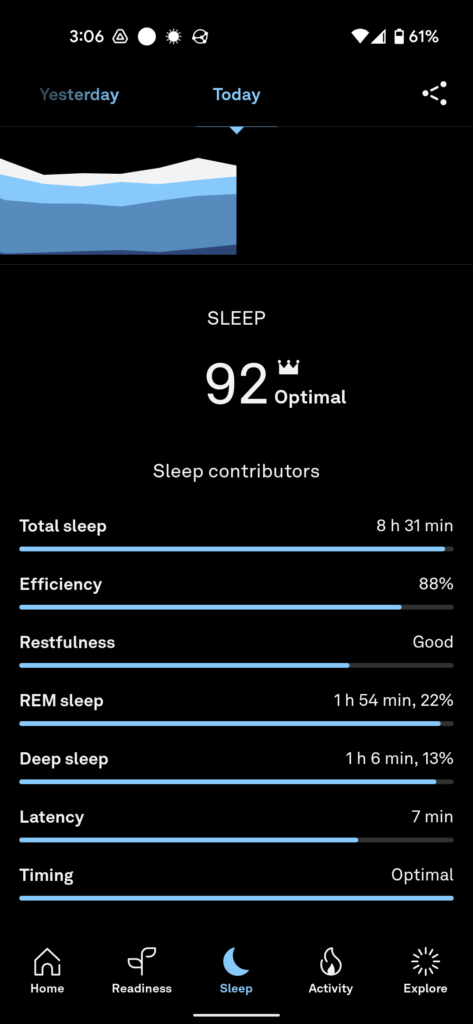We know hyper-palatable foods are bad for us, and that eating a diet based on minimally processed whole foods—such as a paleo diet—is better. I contend that hyper-comfortable beds are bad for similar reasons, and that the sweet spot for bedding comfort will be a level similar to what a caveman could come up with: a paleo bed.
During a recent run I listened to yet another podcast on the importance of getting enough sleep. (Since a bout of wretched sleep a couple of years ago, this topic has been like catnip to me.) As they almost always do, this one included in its list of tips for improving your sleep, getting “the most comfortable bed you can afford.”
I think this is a terrible idea.
Just so you know where I’m coming from, let me mention that I use an Oura ring, which gives me a “sleep score” every day. After making a few changes (primarily around stress reduction, but also changes to when I eat and a few changes to my sleeping environment), I now sleep pretty darned well. Over the last 3 months my sleep score has averaged 86 (out of 100), on a scale where 85 is the cut-off for “excellent” sleep.
The main reason that I don’t get a better score is due to my “Restfulness” score, which is always low. For example, my last night’s sleep got a score of 92, but my Restfulness was just 76, which as you can see qualifies as “Good.” My average Restfulness score over the past 3 months was 71.

I don’t know exactly what goes into the Restfulness score, but I gather that it is primarily affected by movement. Each time you get up during the night your Restfulness score goes down, but just waking up enough to roll over counts against your Restfulness score (as near as I can tell).
Now, this may be reasonable in a sense: waking up repeatedly during the night almost certainly interferes with the quality of your sleep, and having a more comfortable bed will probably mean that you wake up to roll over less often.
I still think it’s a terrible idea. Spending the whole night lying still is—I strongly suspect, based on no evidence whatsoever—probably just as bad for you as spending your whole workday sitting still.
On a good night I might wake up enough to roll over every 90 minutes or so—that is, after each complete sleep cycle I wake up enough to realize that I’ve been lying still long enough to feel a little uncomfortable, and will roll over to find a new, more comfortable position.
As long as I go right back to sleep every time I roll over, I figure it’s all good. (In the past—when I was suffering from higher levels of stress—I would all too often wake up enough to start worrying about something, and that would keep me from falling right back to sleep, interfering with getting a good night’s sleep. These days I’m doing pretty well.)
Sometimes, such as in fancy hotels, I have slept in very comfortable beds. And it’s true that, lying in a pool of memory foam that conforms perfectly to my body, I often get a very good night’s sleep. But then I wake up achy and sore from having been lying too still for eight hours.
As I see it, the same paleo-lifestyle logic applies to bed as to diet and exercise: We evolved to optimize our overall health sleeping in beds that are as comfortable as whatever our paleolithic ancestors slept on. I don’t know that there’s any evidence as to what that was. I suppose people often slept on the ground. Maybe sometimes in a tree? Presumably they made bedding out of whatever they could find—perhaps a bearskin rug, if they happened to kill a bear and didn’t need the hide for something more important than bedding.
Here’s a proposition for you: If you’re sleeping in something that’s more comfortable than you could improvise out of stuff you could find in nature, you’re making the exact same mistake as people eating hyper-palatable industrially produced food-like substances.
Reject the advice to sleep in the most comfortable bed you can afford! Choose a bed that’s about as comfortable as a paleo bed!

I don’t think I could improvise as good a bed in nature as Paleo people knew how to make. I wouldn’t even be up to the bed-improvising standard of a deer or fox But I have also been stiff and sore after a night on memory foam, so perhaps there’s a perfect middle way.
My theory is that our current mattress is about as comfortable as a highly-skilled paleo person could improvise out of found materials, so I think we’re in the sweet spot.